Erdogan’s pyrrhic victory cannot hide the fact he has come home empty-handed
After a meeting in Moscow that lasted nearly 6 hours, the conclusion is simple: Turkish President Recep Tayyip Erdogan returned home empty-handed, having learnt the bitter lesson that his mid-size country has to bend before the iron will of Russian President Vladimir Putin.
The symbols of the meeting, as reflected by pictures and videos, spoke for themselves: A weary Erdogan suppressing his usual angry self before Putin as his team of ministers and security officials lined up, standing as if they were Kremlin sycophants, at the legs of the mighty statue of Catherine the Great, the victor against the Ottomans in the late 19th century.
Back home, all Erdogan is left with is a fragile ceasefire, the future of which is as uncertain as ever, leaving Russia and its protectorate, Syria, free to move ahead to capture whatever is left of Idlib.
“The deal establishes a security corridor on each side of Idlib’s key east-west M4 highway, along which joint Russian-Turkish patrols will begin on March 15,” Reuters reported. “The corridor stretches 6km to the north and 6km to the south of the M4 — effectively advancing Russia’s presence further north into Idlib.”
Gone are the loud threats uttered by Erdogan, who threatened a broader assault on Syrian positions in Idlib if his deadline was not met. The absence of any agreement on what will happen with the Turkish military observation posts also points to continued vulnerability of Turkish Armed Forces personnel.
The apparent humiliation for the Turkish delegation was that Commander-in-Chief Erdogan, with the burden of the massacre of 36 soldiers — unofficial figures mention at least 50 — on his shoulders, had to go all the way to Putin’s office only to find himself returning with the same bitter load. He may know he has been defeated in his latest battle and probably will go on to lose the war.
I have repeatedly argued that Putin would not blink in the face of Erdogan’s gamble and that he would make sure that his Syria — and regional — strategy remained unshattered and that the West, which had hoped that Turkey would start turning to NATO and the European Union, would be proven to be delusional.
In a move whose choreography could only be described as a show of master diplomatic craftsmanship, Putin reasserted his authority, manoeuvring in a way that would not totally alienate Erdogan and his team while simultaneously signalling to the rest of the world who was boss.
As summarised by Maxim Suchkov, a non-resident expert at the Russian International Affairs Council, Moscow won based on a tripartite negotiating strategy:
“First, demonstrate empathy on issues that are sensitive and important to Turkish security. Second, clearly outline your own red lines and a corridor of opportunities for future cooperation on these issues. Third, take advantage of mistakes made by the other parties whose position is important to Ankara — the United States — and use the contrast to your advantage,” he said.
The result of the Moscow meeting: Erdogan was offered a straitjacket, doomed to watch further Syrian-Russian advances according to whatever timetable they like. After his tete-a-tete with Putin, the Turkish president has become even more deeply dependent on Russia.
He may, however, be content for the time being for the conflict to remain, given that this is part of his “survival by crisis” strategy but time is slowly running out for Erdogan. Reliable domestic polls indicate a decline of support for his Syria and Libya policies. It means he will face growing resistance in Turkey, leaving him, possibly, with only one option: become even more of a hardliner at home.
Another takeaway from the Moscow meeting was the underlying fact of how defining Russian mistrust towards the ruling Turkish clique has become. Deep down, Putin has been reminded about how slippery and deceitful Erdogan can be and how intact his jihadist inner core remains. It will be on Syria that Erdogan’s dreams of Neo-Ottoman irredentism, as well as his aspiration to become the supreme leader of the Ikhwan line, will end.
As Marc Champion, writing for Bloomberg News, astutely pointed out: “Erdogan has now doubled down to apply military force where diplomacy failed in both Syria and Libya, only to find the field crowded with other external powers. Meanwhile, he has alienated traditional allies in the West and made enemies of Arab leaders wary of his support for the Muslim Brotherhood.”
In this context, Erdogan’s impulsive weaponising of poor refugees as a show of fierce confrontation with the European Union proves itself to be another huge erratic move. It results in the joint mobilisation of the United States and the European Union to draw a line along the north-eastern and Aegean border of Greece, adding to the solitude of Ankara, which finds itself more or less on its own — rudderless and irrational.
Yavuz Baydar is a senior Turkish columnist, and news analyst. A founding member of the Platform for Independent Journalism (P24) in Istanbul, he has been reporting on Turkey and monitoring media issues since 1980. A European Press Prize Laureate in 2014, he is also the winner of Germany's 'Journalistenpreis' in 2018.
This article was originally published in The Arab Weekly.







